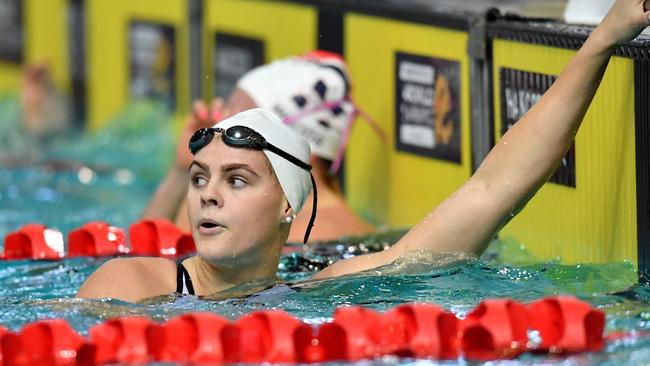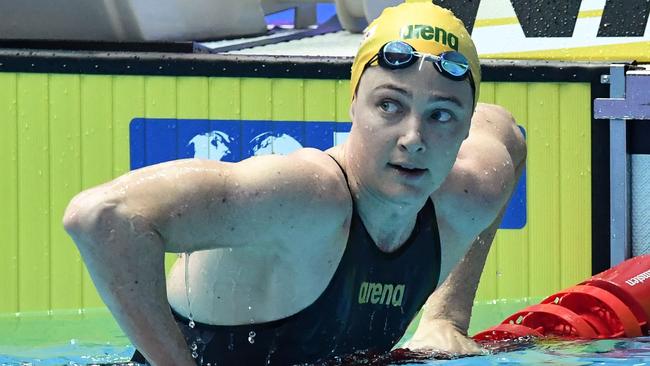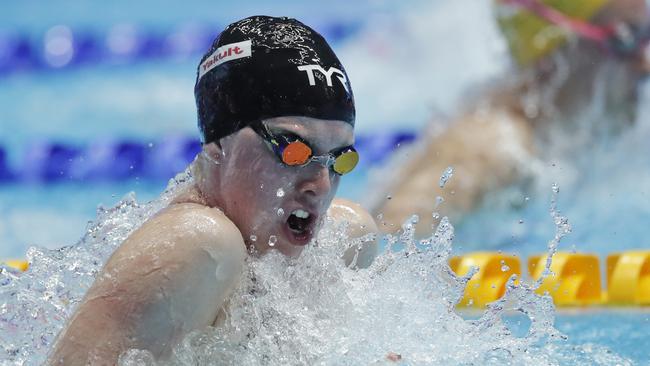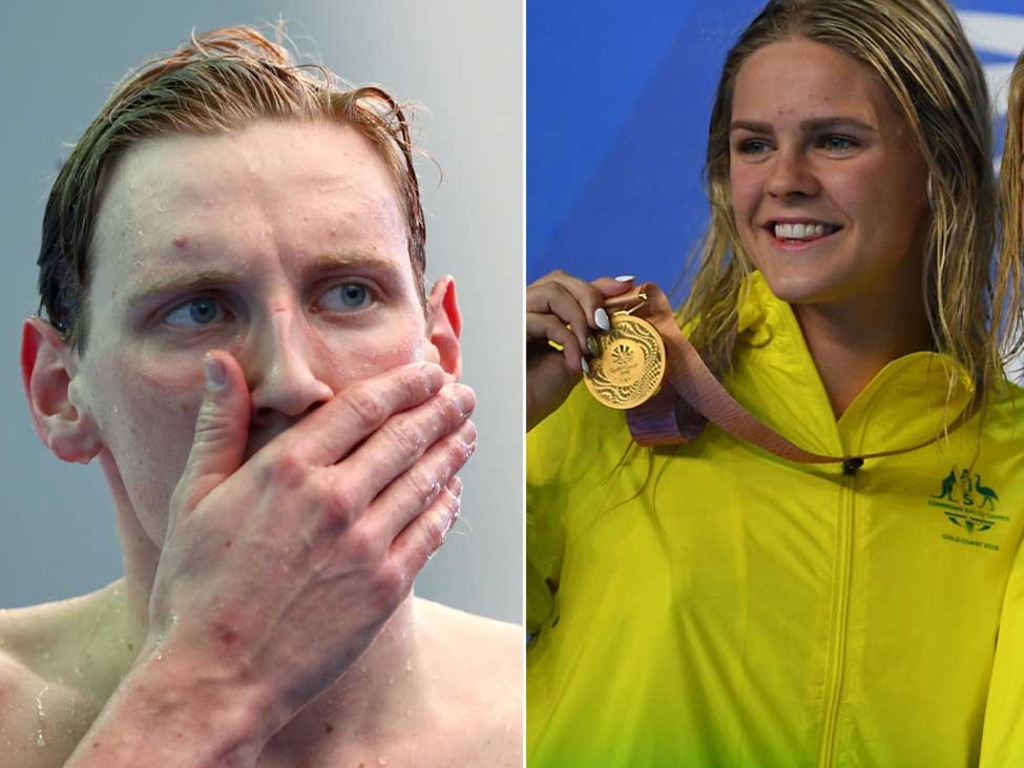Swimmer Shayna Jack reveals details on failed drug test
Swimmer Shayna Jack has released a statement revealing she tested positive to the drug Ligandrol, while maintaining her innocence.

Rising swimming star Shayna Jack has revealed she tested positive to Ligandrol in both her A and B sample tests.
Jack posted a link to a two-page statement to Instagram after Swimming Australia confirmed she had returned a positive doping test.
Ligandrol reportedly induces muscle growth and was flagged by the Australian Sports Anti-Doping Authority last year for a rise in its use by athletes.
Also known as LGD 4033, Ligandrol is what is known as a selective androgen receptor modulator (or SARM) which are drugs designed to have tissue-specific activation to increase muscle mass and bone density, while avoiding the negative side effects associated with steroid use.
It was originally developed for the treatment of muscle wasting conditions such as ageing, osteoporosis, muscular dystrophy and cancer to improve lean body mass and has not yet been cleared through clinical trials.
Shayna Jack’s full statement (PDF)
Jack maintained her innocence and expressed her distress upon being contacted by ASADA after a positive A sample test.
“I felt my heart break instantaneously. I couldn’t breathe to answer her next couple of questions. There was nothing I could do at that moment, nothing the people around me could do to help me.
“I was in complete shock, asking myself how and why is this happening to me. My brain repeated over and over: “I have always checked my substances.
“I didn’t do this”, “why is this happening to me?”, “I’ve done nothing wrong”.
Jack also spoke of her physical reaction when her B sample test results came in.
“I had felt a sense of hope knowing I didn’t take this substance and that it was all a mistake during the testing and that I could return to compete for my country and with the team, however, that wasn’t the case.
“As I read the results, my brain couldn’t even comprehend what I was seeing. I had to reread it several times before I felt that same pain and heartache all over again.
“I instantly turned to my grandma, who was with me at the time and wailed.
“With my legs no longer holding me up, I fell to the ground.”
Jack said would continue to fight to clear her name.
“I get tested approximately every four to six weeks, so why would I take anything banned and do this to myself?
“Especially leading up to competition where I could be tested daily.
“Why would I put myself through this anguish and risk jeopardising my career and my character? I did not and would not cheat and will continue to fight to clear my name.”
Vocal anti-doping campaigner and Jack’s Australian teammate Mack Horton said he was “let down” by the news of her positive drug test, but remains firm on his stance.
“I was disappointed to learn...that a fellow Dolphins team member had recently returned a positive A sample,” Horton told the Seven Network.
“I applaud the decision to immediately withdraw the athlete in question from further competition until this matter is resolved. My position remains firm - clean sport must be a priority for all athletes, all sports and all nations.”
Horton had used the world championships to take a high-profile stand against doping in sport, refusing to share the podium with Chinese swimmer Sun Yang, who he branded a “drug cheat”.
Positive drug test ‘an embarrassment’
Swimming Australia CEO Leigh Russell has described the Shayna Jack positive drug test as bitterly disappointing and embarrassing for the national swimming team, the sport and the country.
She says SA’s agreement with the Australian Sports Anti-Doping Authority did not allow it to reveal news of Jack’s test at the time when she was notified and sent home from the team’s training camp in Japan ahead of the world championships in South Korea.
Russell told reporters in Melbourne on Sunday she understood Jack was planning to reveal the positive test on her A sample later this week once the national team had finished competing.
“I do want to say that while an Australian athlete returning an adverse result is both bitterly disappointing and embarrassing to our team, our sport and our country, it does not in any way change the zero tolerance view that Swimming Australia has and our continuing fight for a clean sport.”
Russell said Swimming Australia has been castigated for not having an official address the media at the world championships on Saturday once the story broke.
“I do accept the criticism that we did not have an official speak poolside last night and that Cate Campbell spoke on behalf of our team. That was my call,” said Russell.
“In retrospect we could have done that differently but I do want to acknowledge Cate and her leadership and our team.”
The substance Jack tested positive to has not been revealed and that may not be made public for months, unless she chooses to announce it, as the matter is bound by confidentiality while it is investigated.
“We’re told by that it can take some months. So we’re not expecting a very quick resolution to this process,” said Russell.
“I also want to make it clear that Shayna is entitled to a natural justice and a fair process and that process is continuing.” The positive test was particularly embarrassing as the news came after a week in which Australian swimmer Mack Horton tooka very public stand by refusing to share the podium with controversial Chinese star Sun Yang due to allegations about him.
Russell said the same confidentiality restrictions had prevented SA from alerting the team to Jack’s plight.
She insisted that didn’t change SA’s view of Horton’s protest, despite international criticism that it now appears hypocritical.
“No, I think that Mack has made a stand for something that he truly believes in. I think we actually have the same stance.We absolutely do not want drugs in our sport.
“I think that Mack made a stance that he absolutely is comfortable with and would be comfortable with that today.” Russell said Jack was at home with plenty of family support and was also being supported by SA
Teammate in dark over test result
Senior team leader Cate Campbell has come out fearlessly in favour of clean sport in the first public statement from the Australian swim team after Swimming Australia confirmed a positive doping test had been returned by one of their own, rising star Shayna Jack.
Campbell said the Jack case showed how firmly the Australians were against banned enhancing substances.
Vehement anti-drugs campaigner Lilly King of the US team, meanwhile, spared Jack not at all when she spoke to the Australian media on Saturday night, point blank calling her a “drug cheater”.
Speaking after she had won her semi-final of the 50m freestyle at the FINA world championships in the second-fastest time, 24.09sec, to advance to the final on Sunday, Campbell said nothing had changed in Australia’s drug stance after Jack had tested positive for what is being termed “a banned substance’’.
“I had absolutely no knowledge of this before tonight,” said Campbell, at 27 the oldest swimmer in the team and a former training partner of Jack before the Campbell sisters moved to Sydney.
“I knew before was that it was a personal matter and we were respecting her privacy. We have to respect the process. We stand for clean sport and the fact that Shayna isn’t here strengthens that stance.”
Jack left the team earlier this month before the championships in Gwangju “for personal reasons”. But now on her social media, she has confirmed the test result and indicated she knew what the substance was but said “I did not take this substance knowingly’’.
She posted (including on Facebook, above) that “I would never intentionally take a banned substance that would disrespect my sport or jeopardise my career.
“Now that there is an ongoing investigation and my team and I are doing everything we can to find out when and how this substance came into contact with my body.”
Campbell was asked whether the positive test would embarrass Australia in the eyes of the world after the hard line it had taken at these world championships, especially through the podium protests of Mack Horton.
“I think it further strengthens our stance for clean sport and full processes will need to be followed,’’ she said.
“I think that once more information comes to light we can pass judgment but at the moment the Australian team stands for clean sport and unfortunately that is why Shayna is not with us,” she said.

Ariarne Titmus declined to comment after her gutsy bronze medal swim in the 800m freestyle final, being whisked past journalists with tears in her eyes. Jack is a St Peter’s Western clubmate, someone she trains alongside every day. The reality of the news delivered in a team meeting just before Saturday night’s session of finals is hitting home.
The sad thing was that she had plenty of reasons to smile after swimming the fastest 800m of her life, 8.15.70, just two seconds behind American rival Katie Ledecky (8.13.58) and silver medallist Simona Quadarella (8.14.99)
Jack was tested by the Australian Sports Anti-Doping Authority on June 26 during the Australian team’s pre-world championship training camp in Cairns.
She was informed once the team travelled on to Japan of the positive drug test. Under regulations, the only way Swimming Australia could have released the real reason why Jack had pulled out was if Jack herself had given permission.
The Dolphins competed in Gwangju under a cloud on Saturday night, as journalists from all around the world, but especially China, seized on the equivalence of Jack’s case to Sun Yang’s and Yulyia Efimova, the Russian swimmer accused by King at the Rio Olympics of being a drug cheat.

When King was bailed up for accusing Sun Yang of being a cheat by a Chinese journalist, she insisted he has tested positive for banned substances.
“You call Sun Yang a cheat, why do you not call Shayna Jack a cheat?” the journalist persisted.
Said King: “She is a drug cheater. She has tested positive on a drugs test. I don’t know the details on the case so we will see.”
Swedish all-rounder Sarah Sjostrom, who dominated the 50m butterfly on Saturday night, couldn’t bring herself to condemn Jack, not yet at least. “It is always very sad when it is about doping and swimming because I love swimming, so talking about doping is very sad.”
Asked if it made her a drug cheat, she replied: “I don’t know. I actually just found out about this a moment ago so I don’t have any other comment to make.”
South African Chad le Clos said that no exception could be made, even if many countries did make them.
“I’m not sure what the case is but my stance is always the same: if you test positive, you shouldn’t be allowed to swim. Anyone that takes performance-enhancing drugs shouldn’t be allowed to swim, simple,’’ he said.
“I might get in trouble for saying this but I definitely think that if certain swimmers tested positive they’d be banned for life but some didn’t because of the federations behind them. I mean, who’s swimming tonight guys, look who’s swimming this week [an apparent reference to Sun Yang].
While all this was unfolding, Kaylee McKeon was winning silver for Australia in the 200m backstroke in a career-best 2.06.26, though well behind American 17-year-old Regan Smith, who flirted with her own world record before finishing in 2.03.69, .34sec astray.
And Caeleb Dressel continued his world championship rampage here. Two years ago in Budapest, he grabbed seven golds and he is well on his way to equalling that in Gwangju, winning golds four and five within half an hour of each other, blitzing the 50m freestyle in 21.04sec and then destroying the 100m butterfly field, his winning time, 49.66sec, 1.17sec ahead of silver medallist Andrei Minakov, with South African le Clos fully 1.5sec in arrears.
And then for good measure, Dressel annexed gold number six in the mixed freestyle relay, fighting off Kyle Chalmers by .03sec in an epic opening leg, before Simone Manuel finished off the job, fighting off a desperate anchor leg challenge from Bronte Campbell to touch in a new world record mark of 3.19.40.
The Australian quartet of Chalmers, Clyde Lewis, Emma McKeon and Campbell came home in 3.19.97.
Australia won two silvers and a bronze on Saturday night but after the Dressel onslaught any thoughts of winning the meet are gone. The Americans lead with 11 golds, 6 silver and 5 bronze (22 medals) from Australia 5-8-4 (17).




To join the conversation, please log in. Don't have an account? Register
Join the conversation, you are commenting as Logout